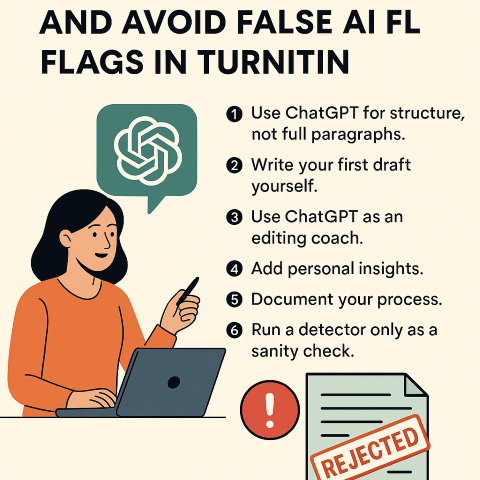If you’ve ever written an essay or report with ChatGPT’s help, only to see it flagged as “50% AI-generated” by a detector, you’re not alone. Even when students or professionals use their own words, AI detectors sometimes misread the tone and structure as machine-written.
Here’s the good news: you can work with AI tools ethically and still produce writing that’s authentic, original, and unmistakably human.
Why AI Detectors Flag Text
AI detectors like Turnitin’s are trained to look for linguistic patterns that large language models tend to produce — such as:
- Uniform sentence structure and rhythm
- Overly polished or neutral tone
- Lack of personal reflection or lived examples
Even minor edits to AI-generated drafts won’t always remove those patterns, which is why the safest and most ethical approach is to use ChatGPT as a coach or assistant, not as an author.
A Workflow That Keeps You Safe and Original
Here’s a simple 6-step approach that works for both students and professionals:
- Use ChatGPT for structure, not full paragraphs.
Ask for outlines, bullet points, or lists of ideas — not finished essays. - Write your first draft yourself.
Close ChatGPT and write freely in your own words. Don’t worry about grammar yet. - Use ChatGPT as an editing coach.
Ask it to polish your writing while keeping your tone intact.
Example: “Edit my paragraph for clarity and flow, but keep my voice and phrasing.” - Add personal insights.
Share your own examples, experiences, or context — things no AI can invent. - Document your process.
Keep drafts and notes. It shows your originality if a question arises later. - Run a detector only as a sanity check.
If it still flags AI-like text, it’s usually because it sounds too generic. Add more reflection or specificity.
Ethical Prompts You Can Use
Here are some copy-ready prompts to guide your writing process.
🧩 For generating ideas
You are an academic brainstorming assistant.
Give me an outline and 5 example ideas for an essay on [TOPIC].
Make them specific to my context: I am [describe yourself briefly].
✍️ For editing while preserving your voice
You are an editing coach.
I’ll paste my paragraph below.
Improve clarity and grammar but keep my voice and tone.
Explain each major change briefly.
[PASTE PARAGRAPH HERE]
💡 For deepening analysis
Act as a critical reviewer.
Suggest 3 ways to strengthen my argument — one by adding evidence, one by personal reflection, and one by addressing a counterpoint.
Tips to Sound Authentically You
- Mix short and long sentences naturally.
- Use first-person or specific examples (“When I worked on…”).
- Replace generic phrases with lived experience (“I found that…”).
- Avoid letting ChatGPT “over-polish” your writing — a few quirks show personality.
Final Thoughts
AI is an amazing tool — but it’s not a substitute for your own mind and voice. The safest, most authentic approach is to use ChatGPT as a collaborator that helps you think, organize, and refine — never to do the thinking for you.
Written with insights from ChatGPT (GPT-5, OpenAI) — refined and formatted by Recep Guzel.
